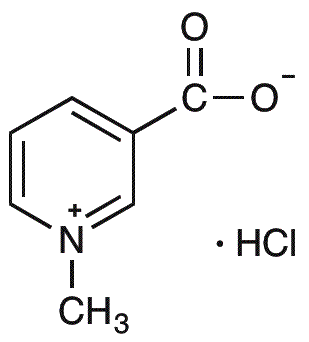Trigonelline hydrochloride is widely utilized in research focused on:
- Pharmaceutical Development: This compound is often explored for its potential therapeutic effects, particularly in managing diabetes and metabolic disorders. Researchers are investigating its role in enhancing insulin sensitivity.
- Food Industry: Trigonelline is found in coffee and is studied for its antioxidant properties. It can be used as a natural preservative, helping to extend the shelf life of food products while maintaining flavor and quality.
- Cosmetics: The compound is being incorporated into skincare products for its moisturizing and skin-soothing properties. It can help improve skin texture and hydration, making it valuable in cosmetic formulations.
- Biotechnology: In plant research, trigonelline is examined for its role in plant stress responses. It can enhance plant resilience to environmental stressors, making it relevant for agricultural applications.
- Neuroscience: Studies are exploring its neuroprotective effects, with potential applications in treating neurodegenerative diseases. This could lead to innovative treatments for conditions like Alzheimer's and Parkinson's disease.
Información general
Propiedades
Seguridad y normativas
Aplicaciones
Trigonelline hydrochloride is widely utilized in research focused on:
- Pharmaceutical Development: This compound is often explored for its potential therapeutic effects, particularly in managing diabetes and metabolic disorders. Researchers are investigating its role in enhancing insulin sensitivity.
- Food Industry: Trigonelline is found in coffee and is studied for its antioxidant properties. It can be used as a natural preservative, helping to extend the shelf life of food products while maintaining flavor and quality.
- Cosmetics: The compound is being incorporated into skincare products for its moisturizing and skin-soothing properties. It can help improve skin texture and hydration, making it valuable in cosmetic formulations.
- Biotechnology: In plant research, trigonelline is examined for its role in plant stress responses. It can enhance plant resilience to environmental stressors, making it relevant for agricultural applications.
- Neuroscience: Studies are exploring its neuroprotective effects, with potential applications in treating neurodegenerative diseases. This could lead to innovative treatments for conditions like Alzheimer's and Parkinson's disease.
Documentos
Hojas de datos de seguridad (HDS)
La SDS proporciona información de seguridad completa sobre la manipulación, el almacenamiento y la eliminación del producto.
Especificación del producto (PS)
La PS proporciona un desglose completo de las propiedades del producto, incluida la composición química, el estado físico, la pureza y los requisitos de almacenamiento. También detalla los rangos de calidad aceptables y las aplicaciones previstas del producto.
Certificados de análisis (COA)
Busque certificados de análisis (COA) ingresando el número de lote del producto. Los números de lote y de partida se pueden encontrar en la etiqueta de un producto después de las palabras "Lote" o "Lote".
Número de catálogo
Número de lote/lote
Certificados de origen (COO)
Este certificado de origen confirma el país en el que se fabricó el producto y también detalla los materiales y componentes utilizados en él y si se deriva de fuentes naturales, sintéticas u otras fuentes específicas. Este certificado puede ser necesario para cumplir con las normativas aduaneras, comerciales y regulatorias.
Número de catálogo
Número de lote/lote
Hojas de datos de seguridad (HDS)
La SDS proporciona información de seguridad completa sobre la manipulación, el almacenamiento y la eliminación del producto.
DownloadEspecificación del producto (PS)
La PS proporciona un desglose completo de las propiedades del producto, incluida la composición química, el estado físico, la pureza y los requisitos de almacenamiento. También detalla los rangos de calidad aceptables y las aplicaciones previstas del producto.
DownloadCertificados de análisis (COA)
Busque certificados de análisis (COA) ingresando el número de lote del producto. Los números de lote y de partida se pueden encontrar en la etiqueta de un producto después de las palabras "Lote" o "Lote".
Número de catálogo
Número de lote/lote
Certificados de origen (COO)
Este certificado de origen confirma el país en el que se fabricó el producto y también detalla los materiales y componentes utilizados en él y si se deriva de fuentes naturales, sintéticas u otras fuentes específicas. Este certificado puede ser necesario para cumplir con las normativas aduaneras, comerciales y regulatorias.


